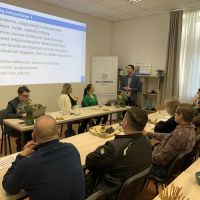Report on the „Vibrant Cross-Border Labour Markets” conference
Knowledge sharing + Policy-making | 27 February 2023
Knowledge sharing + Policy-making | 27 February 2023
On 18 and 19 January 2023 the European Commission organised in Brussels a conference titled “Vibrant Cross-Border Labour Markets” to discuss the inherent potentials and challenges of cross-border employment.
CB labour markets have huge potentials as one the one hand they provide wider access to job opportunities for citizens while allowing them to reside in their regions and on the other hand the enterprises can select employees from a bigger pool of applicants. At the same time, there are still many obstacles in commuting across the border, and often it is problematic to know which policies at all decision-making levels should be taken into consideration.
The 32 speakers come from 14 European countries and had very different backgrounds. The list of speakers includes practical solutions providers such as EURES, cross-border advisory institutions, speakers from academia, legal professionals, a member of the Committee of the Regions and experts from a range of policy areas. Many of the speakers presenting cases in the breakout sessions have been previously involved with the b-solutions initiative. Among others presentations were delivered by Marc Lemaître, director general for DG REGIO, Christian Dupesses, president of MOT and Carl Heinz Lambertz, president of AEBR.
The conference’s agenda addressed the main challenges related to cross-border mobility. Plenary lectures started the event, then thematic sessions followed. Most of the presentations presented an example of a border region.
In the first panel four topics were explored:“Better access to cross-border labour markets” focused on the key topics of available methods for analysing labour law and discussed the conditions for payment of benefits. The “Obstacles impede regional labour markets from balancing each other”, which mentioned the national security aspects, and the aspiration towards national cohesion, while“The importance of cross-border mobility”, presented the specificity of CB commuters. Finally, the “Challenges of the recognition of qualifications in a cross-border context” commented on the popularity of remote working, unobstructed recognition of medical qualifications and issuance of diplomas for several countries.
During the Parallel Breakout Session the topic was the “Challenges in taxation of individuals”, where the concept of teleworking was explained, also described the problems of social insurance jurisdiction, fair taxation, tax return, and ways to tackle cross-border tax obstacles facing individuals within the EU. On the Parallel Sessions presentations about “Recognition of qualifications”, and “Information on the job market” were held.
The next Plenary keynote was dedicated to “Cross-border labour markets seen from the territorial perspective” and contained an introduction of the geographical and infrastructural viewpoint regarding CB commuters, besides of a review of the principle of fair distribution of resources.
On 19 January, the session “Social security access for cross-border workers” drew attention to pension rights of CB workers, the difference in the administration process between small enterprises and big companies (e.g. management of different currencies), and to the operation of mini-jobs and authorities, and health care. The Parallel Session’s focus was on the “Post-covid era – the fiscal challenges of teleworking”, and “Cross-border education”.
In the following the Plenary called “Fair distribution of taxes in transfrontier areas”, the Panel “Cross-border taxation challenges”– contained a series of interesting presentation on “The Fair Taxation package”, “The challenge for tax administrations to be capable to provide coherent information”, and “Clarity issues of social security contributions and access”. These presentations also analysed the topics of in-person and digitalised administration, and the potential of creating new job opportunities by eliminating the obstacles regarding cross-border markets.
In the last Plenary and Closure, the focus oriented towards “The positive impact of cross-border work in socio-economic development”, and an example “The experience of a regional government with large number of cross-border commuters” which contributed to raise awareness of language barriers affecting CB workers.
The main conclusion of the event was that without the positive approach of the member states, improvement can not be expected regarding CB commuting. This also implies the need for the participation of authorities in the future.
If you are interested in this subject, you can rewatch the conference here: https://crossborderlabour.regio-events.eu/

 EGTC-Workshop 2023/1 (Budapest)
EGTC-Workshop 2023/1 (Budapest)